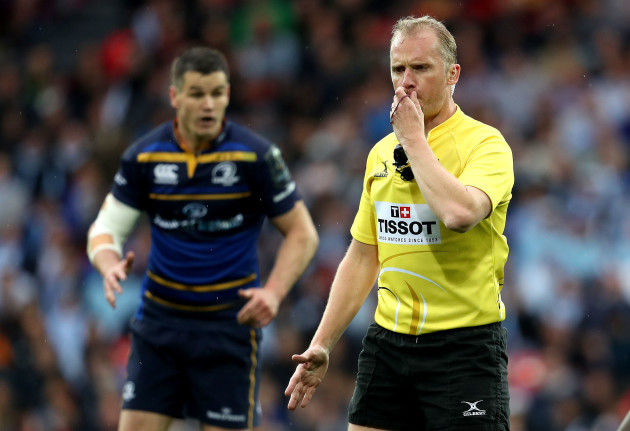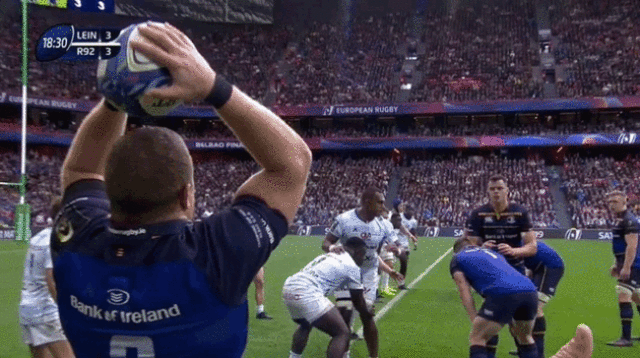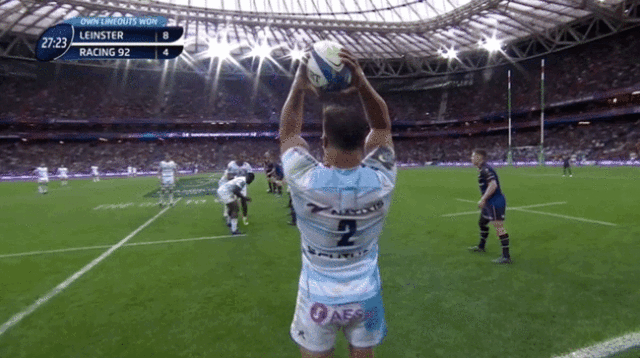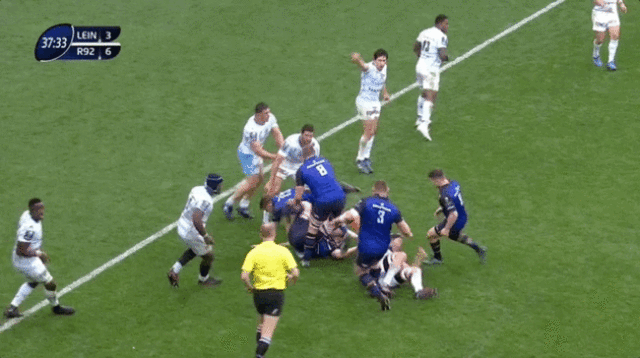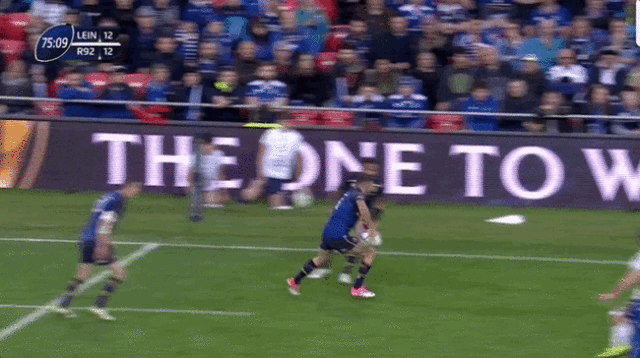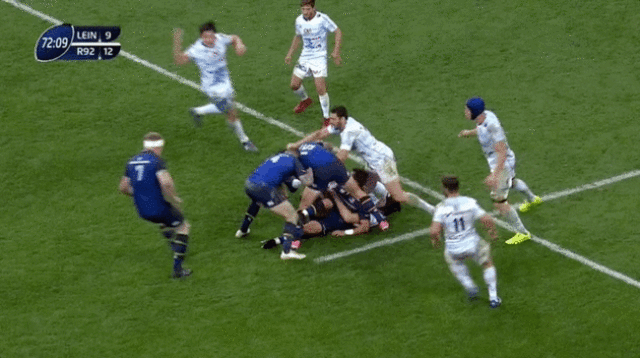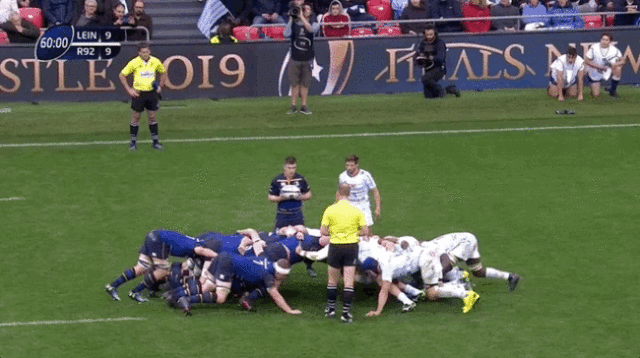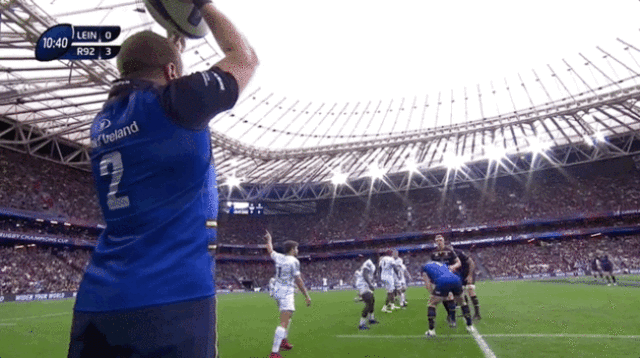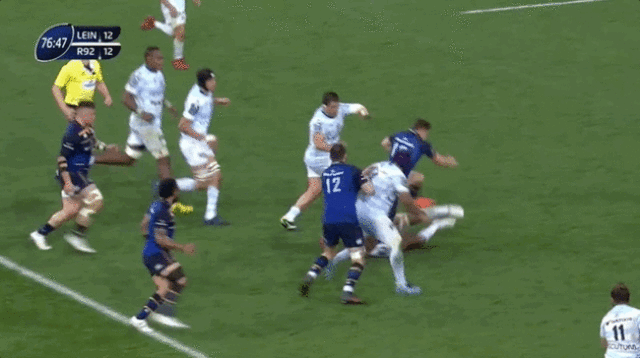THERE ARE MANY factors that go into deciding rugby games and while refereeing is not always the main reason for a team winning or losing, the decisions of the match officials have an important bearing on the outcome, particularly in close contests.
Here at The42, we want to start taking a closer look at refereeing performances in some of the biggest rugby games.
The intention is not to criticise or call out match officials – far from it. Our hope is that by examining and discussing the big calls and some of the less obvious decisions, we can increase our knowledge of the laws of the game and, hopefully, help our readers to do the same.
Our aim is to highlight good refereeing decisions as well as questioning whether others were really correct.
As always, we encourage debate but ask people to refrain from personal or needlessly harsh criticism.
As we carry out these ref reviews, we will ask a current referee to add their view of incidents into the mix. Their contributions will be marked as ’referee’s view‘.
For the main part, the referees will remain anonymous as they are still active in the game, but we hope that their expert view can provide greater clarity.
Here, we look at last weekend’s Champions Cup final between Leinster and Racing 92.
Overview:
Leinster had a 15-12 win over Racing in the European final at San Mamés, with all of the points in the game coming from penalties.
The breakdown was a ferocious battle at all times, while the defences were very much on top of the game.
Referee Wayne Barnes awarded 26 penalties in total, with Racing more heavily penalised on a 15-11 count.
Barnes’ assistant referees, JP Doyle and Tom Foley, were vocal throughout the game, including for the final penalty, which allowed Leinster to win the game.
18:30 – Lineout entry
Leinster’s Dan Leavy is penalised for entry into the lineout from the ‘receiver’ position before Sean Cronin has thrown the ball into the lineout.
Click here if you cannot view the clip above
“No, fellas, your entry, your entry,” says Barnes after blowing his whistle. “Two metres, please, stay two metres. You called six [in the lineout] and then your receiver walked in and threw him up.”
The relevant part of the lawbook here is Law 18.16:
Referee’s view:
“The player in the scrum-half position, Leinster 7, can only enter the lineout to lift or be lifted when the ball leaves the hooker’s hands.
“We get a good example of this being done correctly later by Racing. Look at 27:24 in this game [below], when the Racing player does it and isn’t penalised. Both of these clips show good refereeing.”
Click here if you cannot view the clip above
37:35 - Deliberate knock-on
Racing’s Leone Nakarawa is penalised for a deliberate knock-on as Leinster attack just outside the Racing 22.
Click here if you cannot view the clip above
Assistant referee JP Doyle says, “Same numbers here, Barnesy, no more danger, not a yellow, not a yellow.”
Barnes then tells Johnny Sexton and Isa Nacewa, “The defence is already arranged, your penalty, mate” before feeding back to Doyle: “Yeah, it’s not a clear linebreak, the defence is already aligned. I agree.”
Barnes does then warn Racing captain Yannick Nyanga, “You’ve got to be careful now, Yannick, that’s two deliberate knock-ons [Henry Chavancy had already been penalised fo the same offence]. I didn’t think it was a clear linebreak, that’s why it’s just a penalty.”
Law 11.3 applies here:
Referee’s view:
“This should be a yellow card for Racing 5, as it is deemed cynical. In a referee’s mind, this should be an easy yellow card which will never be questioned.
“Whereas when the referee doesn’t give the yellow card here, it becomes a major talking point in the game and the referee ends up having to justify his decision, as we can hear on the ref mic. For those reasons and the deliberate nature of the foul play, this was a yellow card offence.”
75:10 – Above the horizontal
Racing’s Virimi Vakatawa is penalised for lifting Leinster’s Rob Kearney beyond the horizontal in the tackle, allowing Leinster to kick down the line and earn the field position that eventually helps to result in the winning points.
Click here if you cannot view the clip above
Law 9.18 applies here:
Referee’s view:
“In order for a tackle to be completed, you must bring the player down safely.
“Racing 13 drops the ball carrier mid-air which gives the referee his ‘out’. It is seen as not taking due care with the ball carrier.
“The original tackle is illegal, lifting the ball carrier’s legs above the horizontal. That just cannot be done, even if the player fights to the ground and determines the actions.
“A fair penalty call.”
72:11 – Offside
Racing are penalised for offside, allowing Isa Nacewa to kick Leinster back to 12-12.
Click here if you cannot view the clip above
“Offside, none of them got back to the 22,” calls in assistant referee JP Doyle.
“Ok, offside, advantage,” says Barnes in response.
Law 15.4 is relevant here:
Referee’s view:
“This is a poor assistant referee call for offside. It is unclear which Racing player is offside.
“However, there is a no-arms attempted tackle by Racing 9 which went unnoticed.
“A penalty should have been awarded here, but for the dangerous no-arms tackle instead of offside.”
60.06 – Scrum
The previous scrum has collapsed and Barnes tells Tadhg Furlong, “Tadhg, I’ll get him [Racing loosehead Vasil Kakovin] a bit higher, but I need that stronger bind.
Barnes then tells Vasil Kakovin, “Tout droit [straight], tout droit [straight]. J’ai dis avec le bras aussi, j’ai dis [I said about the arm, I said].”
The reset scrum also collapses and Barnes awards Leinster a free kick, saying, “Early drive.”
Click here if you cannot view the clip above
Barnes is referring to Law 19.18:
Referee’s view:
“Racing 17 is clearly bringing down the scrum here and a penalty should have been given to Leinster.
“Also, this was the second time a free-kick was given to Leinster for an early push (the first coming at 34:24).
“The repeat of the offence by Racing should mean upgrading to a penalty. That likely would have meant a shot at goal for Leinster, so this was a big decision not to get right.”
10:41 – Playing the man in the air
Leinster throw into the lineout but Racing’s Donnacha Ryan gets up in front of Devin Toner.
Click here if you cannot view the clip above
The ball goes forward off Ryan and Barnes indicates a scrum advantage to Leinster, saying, “Advantage, knock on.”
However, assistant referee Doyle calls in, “Barnesy, he [Toner] played him [Ryan] in the air, that’s how he won the ball. Penalty against Leinster.”
Barnes asks, “Against who?” and Doyle replies, “Against Leinster. He played his arm in the air, that’s how he won the ball.”
The referees are referring to Law 18.28 (e):
Referee’s view:
“There is little contact from Leinster 4 on Racing 4 here. Instead, look at the Racing lifters, who lift Racing 4 across into the Leinster channel.
“Leinster 4 is entitled to go for the ball. The referees might say to themselves, ‘If the game is played on will anyone even notice?’. The referee even has to ask who the penalty is against here.
“Play on.”
76:51 – The final penalty
Leinster attack from the lineout and Garry Ringrose makes a break, before Leinster recycle and move the ball to the right.
Click here if you cannot view the clip above
Assistant referee Tom Foley calls in, “Racing 22, never onside.”
Barnes says, “Say again?”
Foley replies, “Racing 22, never onside” and Barnes lets Leinster know they have penalty advantage, which they attempt to play with before Barnes returns for the penalty under the posts. Nacewa kicks the winning points.
Referee’s view:
“You have to ask what materiality Racing 22 has on the game here and why this is the penalty given to decide a Champions Cup final.
“The referee looking back on this cannot be happy that the game was decided on this call. It has to be clear and obvious and material. The referee is five metres away and the two assistant referees are 40 or 50m away. The referee has to ask his assistant to repeat because he wasn’t sure of the call himself.
Click here if you cannot view the clip above
“It’s interesting to look at 44:14 [above] and compare it to the penalty to win the game.
“Leinster 13 is offside and clearly breaks up the play.”
What did you make of the big decisions and the refereeing overall in the Champions Cup final?
We would ask again that people hold back from personal or overly harsh criticism, but let us know your take on the incidents above or any others from last weekend’s game. What was well done by the refereeing team and what could have been better?
- This article was updated at 7.57pm to correct Law 9.13 to Law 9.18 in the section entitled ’75:10 – Above the horizontal’.
The42 is on Instagram! Tap the button below on your phone to follow us!
